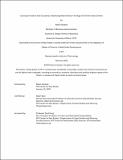| dc.contributor.advisor | Saiz, Albert | |
| dc.contributor.author | Kseibati, Reem | |
| dc.date.accessioned | 2025-03-24T18:49:45Z | |
| dc.date.available | 2025-03-24T18:49:45Z | |
| dc.date.issued | 2025-02 | |
| dc.date.submitted | 2025-01-30T16:44:46.460Z | |
| dc.identifier.uri | https://hdl.handle.net/1721.1/158889 | |
| dc.description.abstract | This thesis examines the growing demand for data centers and the critical challenges posed by their water and energy consumption. As artificial intelligence (AI) technologies expand, the infrastructure supporting these systems has become essential. The study highlights the projected increase in data center capacity driven by AI workloads and focuses on the impact in water-stressed regions across the United States. Given the resource-intensive nature of data centers, the research explores cooling technologies aimed at reducing environmental impact. Traditional air cooling is compared with innovative liquid and evaporative cooling techniques. Additionally, the thesis promotes circular economy principles, emphasizing resource efficiency, reuse, and regeneration as a pathway to sustainable operations. | |
| dc.publisher | Massachusetts Institute of Technology | |
| dc.rights | In Copyright - Educational Use Permitted | |
| dc.rights | Copyright retained by author(s) | |
| dc.rights.uri | https://rightsstatements.org/page/InC-EDU/1.0/ | |
| dc.title | Cooling Innovation and Circularity: Addressing Water Stress in the Age of AI-Driven Data Centers | |
| dc.type | Thesis | |
| dc.description.degree | S.M. | |
| dc.contributor.department | Massachusetts Institute of Technology. Center for Real Estate. Program in Real Estate Development. | |
| mit.thesis.degree | Master | |
| thesis.degree.name | Master of Science in Real Estate Development | |
